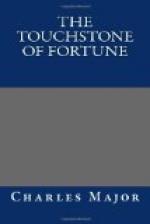Our journey home was made in the rain, Bettina sleeping with her head on my shoulder a great part of the way. And I enjoyed the rain even more than I had enjoyed the sunshine.
We reached London nearly a week before the king’s return, so that nothing was known of our journey at court.
CHAPTER XI
“ALL SUNSHINE MAKES THE DESERT”
Whatever faults Whitehall may have had as a place of residence, dulness was not among them. There were balls, games with high stakes, theatres, gossip, scandals, and once in a long while an affair of state to interest us. In order to interest the court thoroughly, an affair of state must have involved the getting of money for the privy purse; that is, for the king’s personal use, for out of it the courtesans were fed and gambling debts were paid.
The time of our Dover journey was one of extreme depletion in the privy purse. The king had borrowed from every person and every city within the realm who, by threats or cajolery, could be induced to part with money. But now he had reached the end of his tether.
When matters were thus in extremis, some one, probably Castlemain, suggested the sale of England’s possessions on the continent, chief of which was the rich city of Dunkirk, situate on the French side of the Straits of Dover. This fortified city, within a few leagues of Calais, had cost the English nation heavily in blood and gold to gain, and still more heavily to hold, but its value to England commercially and politically was beyond measure.
Since Queen Mary had lost Calais, Dunkirk was the only important foothold England had on continental soil; therefore it was almost as dear to the English people as the city of London itself. Because of its importance, it was greatly coveted by the French king, who shortly before the time of our journey to Dover had made overtures to buy it.
Charles turned a deaf ear to King Louis’s first proposal to buy Dunkirk, not because he loved the city, or cared a farthing for its value to his people, but because he feared the storm of indignation its sale would raise. The Lord Chancellor objected to the sale of Dunkirk, and tried to show Charles the great folly of entertaining the offer. He was the only wise, honest man in the king’s council, and, by reason of his wonderful knowledge of mankind, was called “the Chancellor of Human Nature.” But the king needed money, so after a time he listened to Berkeley, Crofts, Castlemain, and others of like character, whose strongest argument consisted in accusing the king, most offensively, of being afraid of his people.
“Are you not king?” asked Castlemain. “Does not Dunkirk belong to you, and may you not sell that which is your property? Are not these dogs, the people, your slaves, your property? Yet you stand in cowardly fear of a rabble which quakes if you but crook your finger. A like fear of his subjects cost your father his head. The people will crawl before you if you kick them, but let them see that you fear them, and you will learn that there is no cruelty like that of the good people.”




